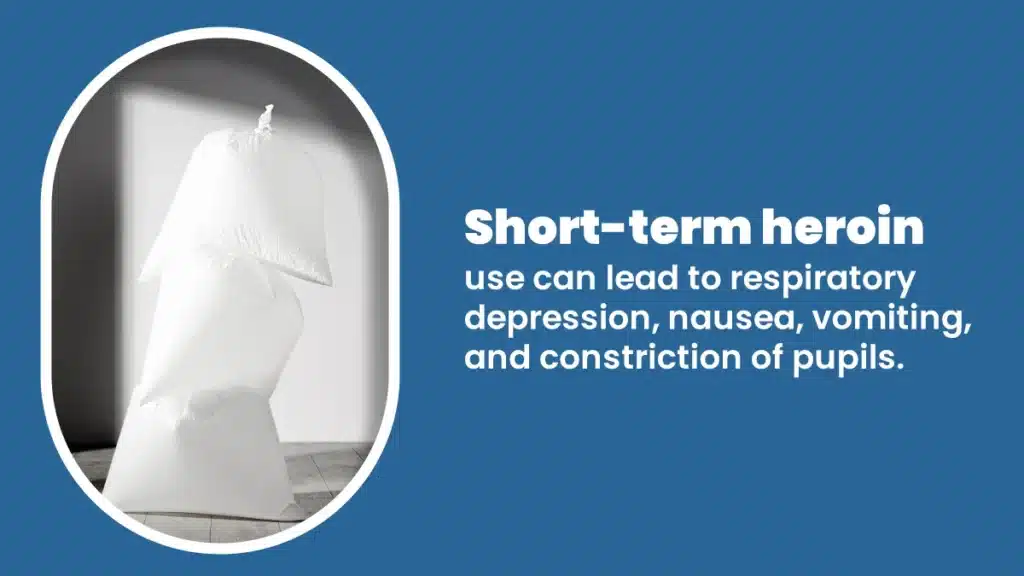Dangers Of Heroin’s Short-term Effects
Heroin is a powerful drug derived from morphine, which comes from the opium poppy plant. Initially introduced as a painkiller, it became widely known for its addictive properties. Heroin affects the brain’s reward system, creating feelings of intense pleasure and euphoria.
Individuals can inject, smoke, or snort this illicit drug, with each method affecting the body differently. Despite its initial medical use, heroin’s potential for misuse became apparent over time, leading to widespread concerns.
Heroin remains a dangerous and addictive illegal drug. In this article, we will discuss the basics of heroin use, its impact on the body and mind, and the importance of understanding its risks and effects.
Key Takeaways
Heroin’s short-term effects impact the body and mind, leading to serious health problems and long-term effects. Below are the points covered in this article:
- Heroin alters brain function and creates euphoria, making it highly addictive with serious long-term effects.
- Short-term heroin use causes physical discomfort, including respiratory depression and mental impairment that can worsen with continued use.
- Repeated use increases tolerance and dependency, requiring professional treatment to address long-term health risks.
- Immediate effects of heroin use provide temporary relief but come with significant risks, including overdose and addiction.
The Haven Detox-Little Rock offers a safe and supportive environment where individuals can begin their journey to recovery with expert care and compassion. Call us at (501) 271-3342 for effective recovery.

Heroin: Explained
Heroin is a drug made from morphine derived from the opium poppy plant. It creates intense feelings of pleasure and euphoria. This addictive opioid drug can be injected, smoked, or snorted, directly affecting the brain’s reward system and leading to chronic use of heroin.
The history of heroin began in the late 1800s; it was introduced as a painkiller and considered safer than morphine. Over time, its high potential for misuse became evident. Despite strict regulations, it remains a widespread concern, affecting communities and individuals in the United States and globally.
People frequently abuse black tar heroin and brown powder heroin, which contribute to the rise in heroin-related health problems and opioid use disorder. Heroin has a powerful effect on the central nervous system, causing intense relaxation and pleasure. These effects may seem appealing, but the associated risks are significant. Addressing these impacts and seeking professional help and treatment options is essential to ensure well-being.
Mechanism Of Action
Regular heroin use affects the brain by binding to opioid receptors. It can lead to a release of chemicals that produce intense pleasure and pain relief. Over time, this can change the brain’s structure and function, impairing decision-making abilities and even permanent brain damage.
How Heroin Affects The Brain
Heroin impacts areas controlling emotions, pain, and pleasure by altering brain processes. It releases endorphins, causing euphoria. Over time, it changes brain function, making emotional regulation and behavior control challenging without the addictive drug. These changes contribute to heroin drug addiction and chronic heroin use, leading to permanent damage to the brain if not treated.
Neurological Impact
Regular use of heroin changes brain structure and function, affecting decision-making abilities, memory, and emotional control. These changes impair everyday thinking and behavior regulation, making it harder to function even after stopping heroin long-term effects of heroin use. It makes prompt medical intervention essential in managing heroin addiction treatment and overcoming substance use disorder.
Interaction With Receptors
Heroin binds to opioid receptors, triggering endorphin release and creating relaxation. Repeated use reduces receptor responsiveness, making the brain dependent on heroin to feel normal and maintain emotional balance. This dependency makes quitting heroin particularly challenging and requires a comprehensive treatment program, including cognitive behavioral therapy (CBT) and other medications.
Immediate Effects Of Heroin Use
Heroin creates immediate effects that are felt soon after use. These initial effects can make the user feel intense pleasure and comfort. Some of them are given below:
Euphoria And Pleasure
Heroin creates a rush of pleasure, making people feel intensely happy. This euphoric effect comes from a boost in dopamine, a brain chemical that controls feelings of reward. The high is often short-lived but influential, creating a sense of contentment and joy. However, the short-term effects of heroin use are fleeting and may cause users to repeatedly seek out heroin, contributing to the cycle of heroin abuse.
Pain Relief
Heroin creates a rush of pleasure, making people feel intensely happy. This euphoric effect comes from a boost in dopamine, a brain chemical that controls feelings of reward. The high is often short-lived but influential, creating a sense of contentment and joy. However, the short-term effects of heroin use are fleeting and may cause users to repeatedly seek out heroin, contributing to the cycle of heroin abuse.
Sedation And Relaxation
After the initial rush, heroin causes deep relaxation and sedation. It slows down the body’s systems, making the person feel calm and at ease. This relaxed state helps people unwind and momentarily escape stress or discomfort, contributing to its appeal.
Physical And Psychological Short-Term Effects
Heroin causes respiratory depression, significantly slowing breathing and increasing the risk of oxygen deprivation. It also leads to nausea, vomiting, goose bumps shortly after use, and intense itchiness that causes discomfort. Another noticeable physical effect is the constriction of pupils, which become visibly smaller.
Psychologically, heroin use disorder brings rapid mood changes, creating feelings of euphoria, memory loss, or irritability. It clouds mental function, making it difficult to think clearly or focus. Additionally, short-term memory impairment is common, causing challenges in recalling recent events and contributing to its disorienting adverse effects.
Health Risks Associated With Short-Term Use
Short-term drug use can lead to severe health risks that affect various body systems. These risks may escalate quickly if use continues. Let’s delve into them.
Risk Of Overdose
Overdosing on drugs, even in a short period, can overwhelm the body, leading to life-threatening complications. Taking more significant amounts than recommended can cause severe harm, affecting breathing and heart function. It’s essential to be cautious and avoid risks that can arise with uncontrolled substance use.
Respiratory Complications
Short-term drug use may cause breathing problems as the body struggles to regulate airflow. In severe cases, substances may interfere with lung function, resulting in shortness of breath or respiratory failure. Breathing difficulties can arise unexpectedly, so knowing the risks associated with specific substances is crucial.
Cardiovascular Effects
Drugs can also have an immediate impact on heart health. Short-term use can cause irregular heartbeats, high blood pressure, or even increased risk of heart attacks. These effects can strain the heart rate and lead to further complications, making it essential to monitor cardiovascular health issues during substance use.
Social Implications
Substance use can affect a person’s social life and interactions. These impacts can shape personal experiences and community dynamics. Below are the following.
Impaired Judgment And Decision-Making
Substance use can reduce the ability to think clearly, causing poor choices. It can lead to risky behavior and regrets. People may act impulsively, forgetting consequences. The ability to evaluate situations carefully is compromised. As a result, important decisions may be made that affect personal and professional life.
Impact On Relationships
Substance use can cause strain in relationships. As behavior becomes unpredictable, it weakens trust and communication. Loved ones may feel neglected, frustrated, or hurt by actions that stem from impaired judgment. Building healthy, supportive relationships becomes difficult when substances interfere with emotional connections.
Legal Issues
Substance use can result in legal problems. Authorities can arrest people for actions associated with impaired judgment, like driving under the influence. Legal troubles can cause lasting consequences, including fines or imprisonment. It can disrupt lives, careers, and personal goals, leading to long-term challenges.
Frequently Asked Questions (FAQ)
How quickly do the short-term effects of heroin appear after use?
The short-term effects of heroin typically appear within minutes after use. The onset is fast, as the drug enters the bloodstream and reaches the brain quickly. Users often experience a rush of euphoria and a sense of relaxation, lasting from a few minutes to several hours, depending on the dose.
As heroin takes effect, physical sensations like warmth and calmness follow, with many feeling a drowsy state. The intensity of the experience may vary, but it generally provides a sense of relief and pleasure. The rapid onset and short duration of effects are a primary reason for its use among individuals.
What are the psychological impacts of heroin in the short term?
In the short term, heroin can induce intense feelings of euphoria, happiness, and relaxation. These effects arise as the drug stimulates areas of the brain associated with pleasure and reward. Users often experience a temporary sense of well-being, with anxiety and stress being replaced by calmness and contentment.
However, the psychological impacts can also include clouded thinking and difficulty concentrating. The feelings of euphoria eventually fade, sometimes leading to a desire to repeat the experience. This temporary mental escape often provides relief from emotional discomfort but can impair judgment and hinder mental clarity, leaving a sense of emotional instability after the effects wear off.
Can the short-term use of heroin lead to overdose?
Short-term use of heroin can lead to opioid overdose, especially if a higher dose is consumed or if it’s mixed with other substances. Heroin suppresses breathing, which can cause it to slow down or stop, leading to life-threatening consequences. Individuals without tolerance to heroin are particularly at risk for overdose.
Signs of a heroin overdose include slow heart rate, bluish skin, and loss of consciousness. Immediate medical attention by health care providers is essential to prevent severe health complications. The risk of overdose exists even with short-term use, emphasizing the dangers of heroin and the high potential for harm, even in seemingly controlled situations.
Healing Begins At The Haven Detox-Little Rock
Restart a new chapter of hope and healing at The Haven Detox-Little Rock. Our expert team is here to support you every step on your path to recovery.
Experience the transformative power of our detox services, designed to help restore your body and mind. Our residential rehab offers a safe, nurturing environment for lasting change while our vital nutrients and NAD IV therapy replenish your health and energy.
So, transform your life with compassion and care. Call us today at (501) 271-3342 and discover the transformative care waiting for you.




